AUTHOR OF THE REPORT: SCHOOL OF PEACEMAKING AND MEDIA TECHNOLOGY IN CENTRAL ASIA
PHOTO: Police detained a Radio Azattyk journalist covering a protest near the government building in Bishkek (January 2023), IGOR KOVALENKO
1/ KEY FINDINGS
In Kyrgyzstan, 64 attacks/threats against professional and civil media workers, editorial offices of traditional and online media outletswere identified and analysed in the course of the study for 2023. Data for the study were collected using content analysis from open sources in Kyrgyz, Russian and English. Reports of incidents sent by media workers directly to experts at the Justice for Journalists Foundation were also analysed. A list of the main sources is provided in Annex 1.
- As in previous years, attacks via judicial and/or economic means remained the main type of attacks against media workers. In 2023 such attacks accounted for 84% of the total number of incidents.
- Compared to 2022, the number of attacks of a non-physical nature and/or cyber-attacks decreased fourfold.
- The draft law “on mass media”, which was submitted to Parliament in May 2023, poses a serious threat to the independence of the media and online resources. According to lawyers, the draft was copied almost verbatim from a similar law adopted in Russia.
- Throughout 2023, the State Committee for National Security (SCNS), the security services and law enforcement agencies of Kyrgyzstan have significantly intensified the prosecution of media workers for their investigative journalism and critical publications.
- In 2023, government officials increased political censorship and began the termination of the Kyrgyz service of Radio Free Europe/Radio Liberty (Azattyk Media) and the public foundation Kloop Media – one of the legal entities of the Kloop independent media outlet.
2/ THE POLITICAL SITUATION AND THE MEDIA IN KYRGYZSTAN
The year 2023 in Kyrgyzstan was marked not only by increased political censorship but also by a crackdown on the media and civil society amid the parliamentary review of two bills: the law “on NGOs” (similar to the Russian “foreign agents” legislation) and law “on mass media”. On 22 February 2024, the law “On NPOs” was adopted after a second reading. The law “on mass media” provides for a number of excessive restrictions, including state regulation of the media and online platforms and sanctions for “abuses of freedom of speech.” As a result, the persecution and harassment of independent media workers who are critical of the government has notably intensified. In addition, an unconstitutional ban on peaceful assembly was introduced.
According to the 2023 annual rankings published by the international NGO “Reporters Without Borders”, Kyrgyzstan ranked 122 out of 180 countries, worsening its 2022 ranking by 50 places. Experts, however, continue to consider Kyrgyzstan an exception among Central Asian countries, as the country shows ” relative freedom of expression and of the press, despite an unstable economy and rampant official corruption.”
In Freedom House’s annual report “Freedom in the World 2023”, Kyrgyzstan was placed in the category of “not free” countries for the third year running. According to Freedom House, political rights in the country are limited and the media are under constant pressure.
In 2023, Kyrgyzstan became one of seven countries that fell in the civil liberties ranking “People Power Under Attack 2023”, compiled by the civil society alliance Civicus Monitor. Kyrgyzstan lost its previous position, scoring 40 points out of 100 in the rating, and therefore moved from a category of countries where civil liberties are oppressed to the next category (“repressive countries”), which includes countries where civil liberties are completely suppressed. Their score dropped due to increasing pressure on civil society and the media, which is directly linked to the introduction of repressive laws used against dissenting opinion, Civicus Monitor experts say.
In 2023, the Parliament of Kyrgyzstan considered a new law “on mass media”, lobbied by the presidential administration. It contains vague and broadly worded bans for media and complicates the requirements for registration and re-registration of media outlets. Non-compliance with this law can lead to forced suspension and closure of media outlets and websites. The bill also holds Internet users accountable as well as journalists. In addition, the regulator will be able to withdraw media outlets’ licences, for example, for publications “defaming the honour and dignity of government officials.” The draft law attracted widespread negative reactions among Kyrgyz society and was recalled for revision with the participation of subject matter experts, lawyers, and human rights activists. A working group was created, which included media representatives with their respective proposals. However, in October, these very same media representatives were prevented from attending the final discussion, and their proposed amendments were ignored.
The Office of the OSCE Representative on Freedom of the Media, alongside the OSCE Office for Democratic Institutions and Human Rights, conducted a joint assessment of the draft Law about the media of the Kyrgyz Republic and stated that “some of the content restrictions proposed in the bill are problematic from the point of view of freedom of expression. They do not appear to serve a legitimate purpose and are not formulated in a clear and specific manner.” On 7 March 2024, Kyrgyz President Sadyr Japarov withdrew the controversial bill and sent it for revision.
There were no updated statistics on the total number of media outlets for 2023 at the time of conducting this report. It is indicated on the web page of the National Statistical Committee of the Kyrgyz Republic that the 2018-2022 annual compendium should have been released by 1 March 2024, but at the time of conducting the report, it had not been released. According to the Unified State Register of Statistical Units, in 2022, there were about 2,000 business entities registered as “mass media” in Kyrgyzstan. There were 177 independent television and radio companies operating in the country. The Central Election Commission of the Kyrgyz Republic, in their statistics, refer to 77 accredited online media outlets and 60 newspapers.
3/ GENERAL ANALYSIS OF ATTACKS
In 2023, 64 attacks/threats were recorded against journalists, bloggers, media workers, and editorial offices of traditional and online media outlets. Since 2022, the number of attacks against media workers has halved. In 85% of incidents, the attacks were committed by representatives of the authorities.
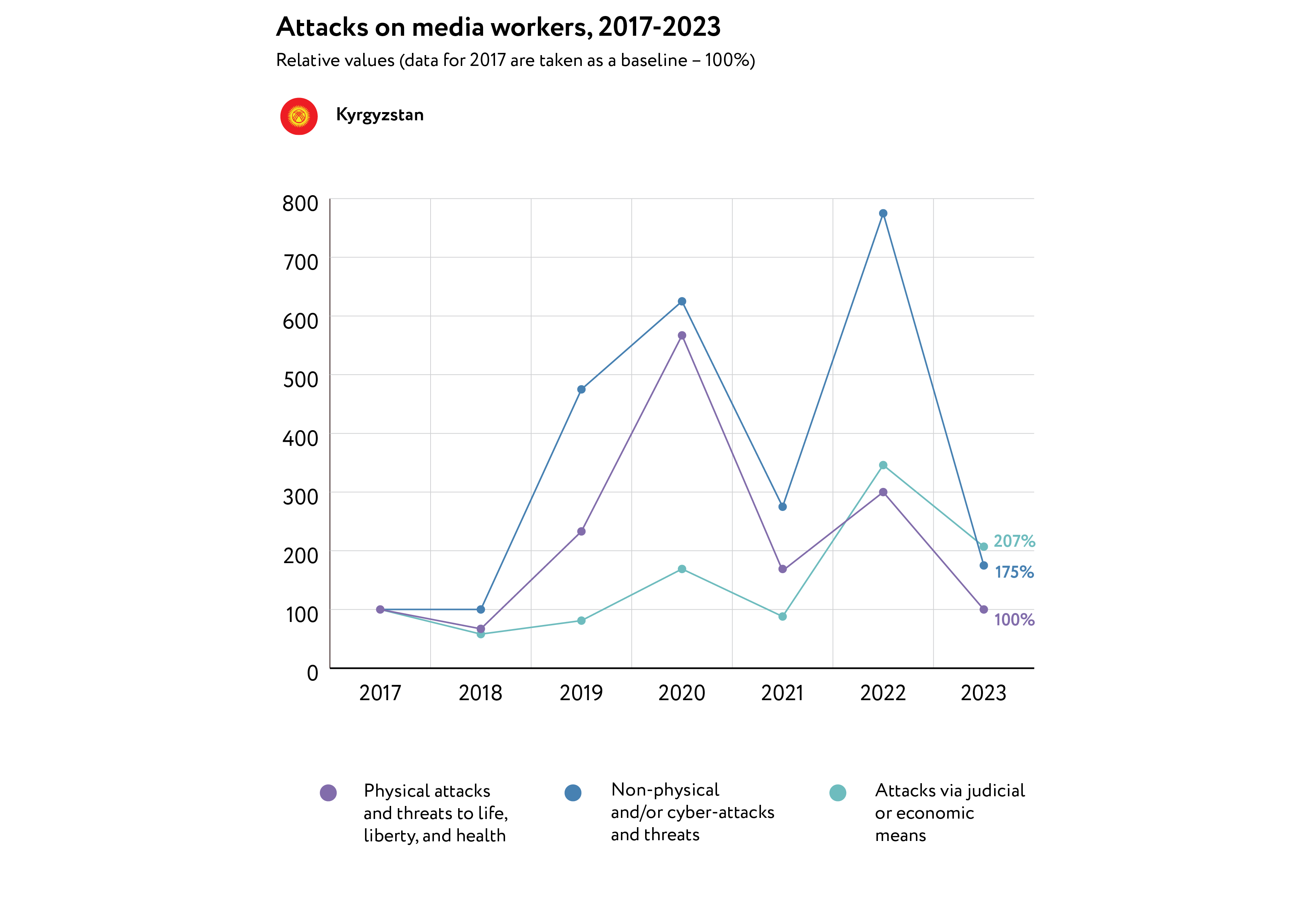
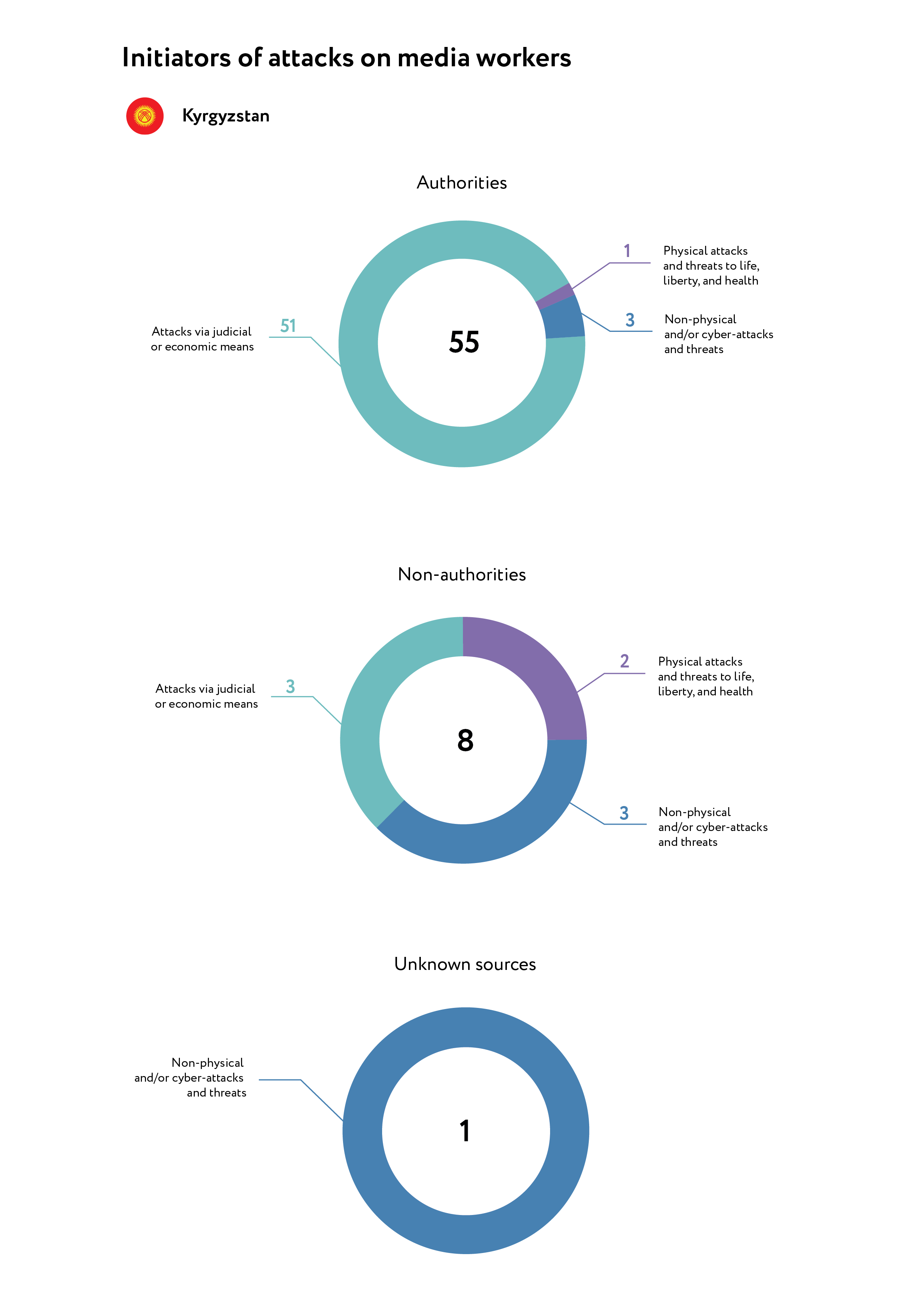
4/ PHYSICAL ATTACKS AND THREATS TO LIFE, LIBERTY AND HEALTH
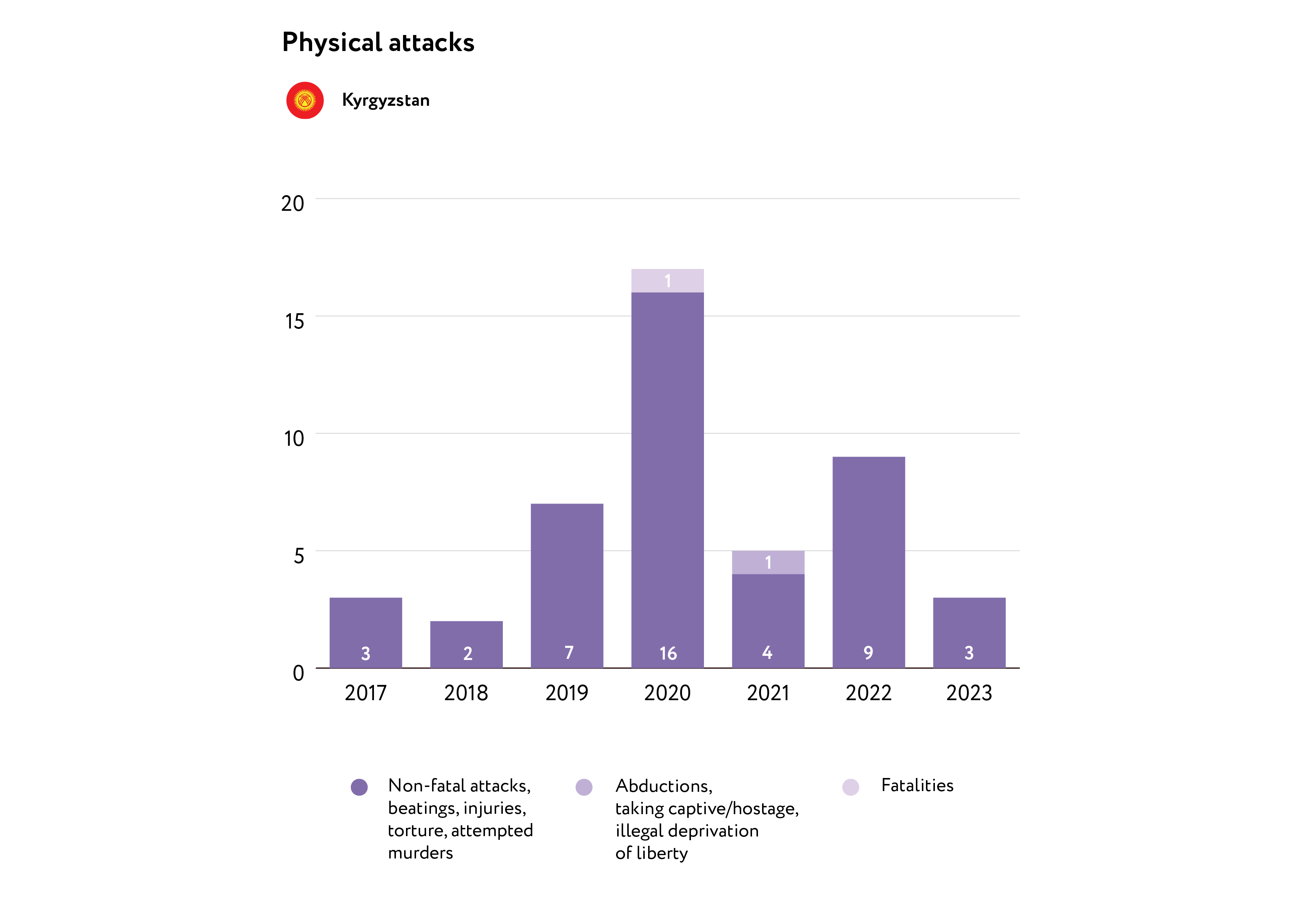
All physical attacks recorded in 2023 were non-fatal and were mostly committed while journalists were performing their professional duties. Compared to last year, three times fewer physical attacks were recorded.
- On 2 May, Gulnaz Midinova, a TV journalist for the independent media outlet Govori TV, was brutally grabbed by bailiffs and dragged out of the Bishkek City Court building without explanation. This happened while she was assembling recording equipment. Officials of the judicial department stated that Gulnaz allegedly filmed the guards and disturbed visitors to the court.
- On 11 May, independent journalist Alexandra Lee was attacked by her neighbours. The attack was preceded by an ongoing domestic dispute with one neighbour, a former police officer. According to the journalist, she and her husband were subjected to xenophobic, ethnicity-related insults from this person. The journalist managed to film the attack carried out by her neighbours (more than one person was involved), who caused the couple physical harm, took away their phones and held them for about 5 hours, editing and deleting the video recordings. The investigating officer refused to press charges of robbery or assault.
- On 12 June, independent journalist Ydrys Isakov was assaulted by the former director of the boarding house “Osh” in the south of the country, where the journalist was filming an investigative report about the property privatised by this person. The police began an investigation and registered this case under “petty hooliganism”. Later the case was dropped due to lack of evidence.
5/ NON-PHYSICAL AND/OR CYBER-ATTACKS AND THREATS
Compared to 2022, the number of non-physical attacks has decreased fourfold. The most common methods of pressure in this category were bullying and intimidation. Representatives of the authorities, including the Kyrgyz president, did not shy away from such attacks:
- Derogatory terms such as “false patriots”, “provocateurs” and “grant lovers” were used by the President of Kyrgyzstan SadyrJaparov in his addresses to the media and NGOs in 2023. These types of speeches would typically follow on from journalist’s publications about investigations into corruption. This negative approach to free and independent media was demonstrated by Japarov in his interview with the pro-government news agency Kabar in August 2023. Referring to KloopMedia and journalists who, according to him, “call themselves independent,” he said: “You have long been of no benefit to the Kyrgyz nation … And it will be the same in the future. I am asking that you do not cause harm if you cannot do good. You write negative things and see only the bad, scaring away billions of dollars in investments.” This was his reaction to an investigation into the owners of the Barcelona FC franchise in Kyrgyzstan. According to the investigation’s findings, besides the relatives of the president, the children of the head of the State Committee for National Security, and an energy tycoon closely associated with “Rosatom”, the franchise owners also included people from the close circle of Kurmanbek Bakiyev (the fugitive president of Kyrgyzstan, who was overthrown in 2010 during the revolution, now living in Belarus and sentenced in absentia to 30 years in prison on corruption charges, and for ordering the shooting of anti-government protesters.)
- In his New Year’s address to the nation, President Sadyr Japarov emphasised that bloggers “make a fuss when discussing public issues” and this phenomenon has “replaced freedom of speech.” Stating: “There are those who call themselves “bloggers” and impose opinions on our society that do not correspond to the mentality of our population.”
- The head of the State Committee for National Security, Kamchybek Tashiev, threatened the media with liability for spreading “incorrect information” after a publication about the arrest of an SCNS officer and a possible brawl between employees of the Ministry of Internal Affairs and the SCNS. According to Tashiev, the arrest of this State Committee for National Security officer was planned under the direct control of the president and there is no “showdown” between law enforcement agencies, so “certain media outlets” must be held accountable for spreading this idea.
- Edil Baisalov, Deputy Prime Minister of the Republic of Kyrgyzstan, wrote on his Facebook page that the government would take action against “out-of-bounds” bloggers. Baisalov used the example of blogger Ulukbek Karybek uulu, who had previously posted a video of violations in one of the capital’s childcare centres.
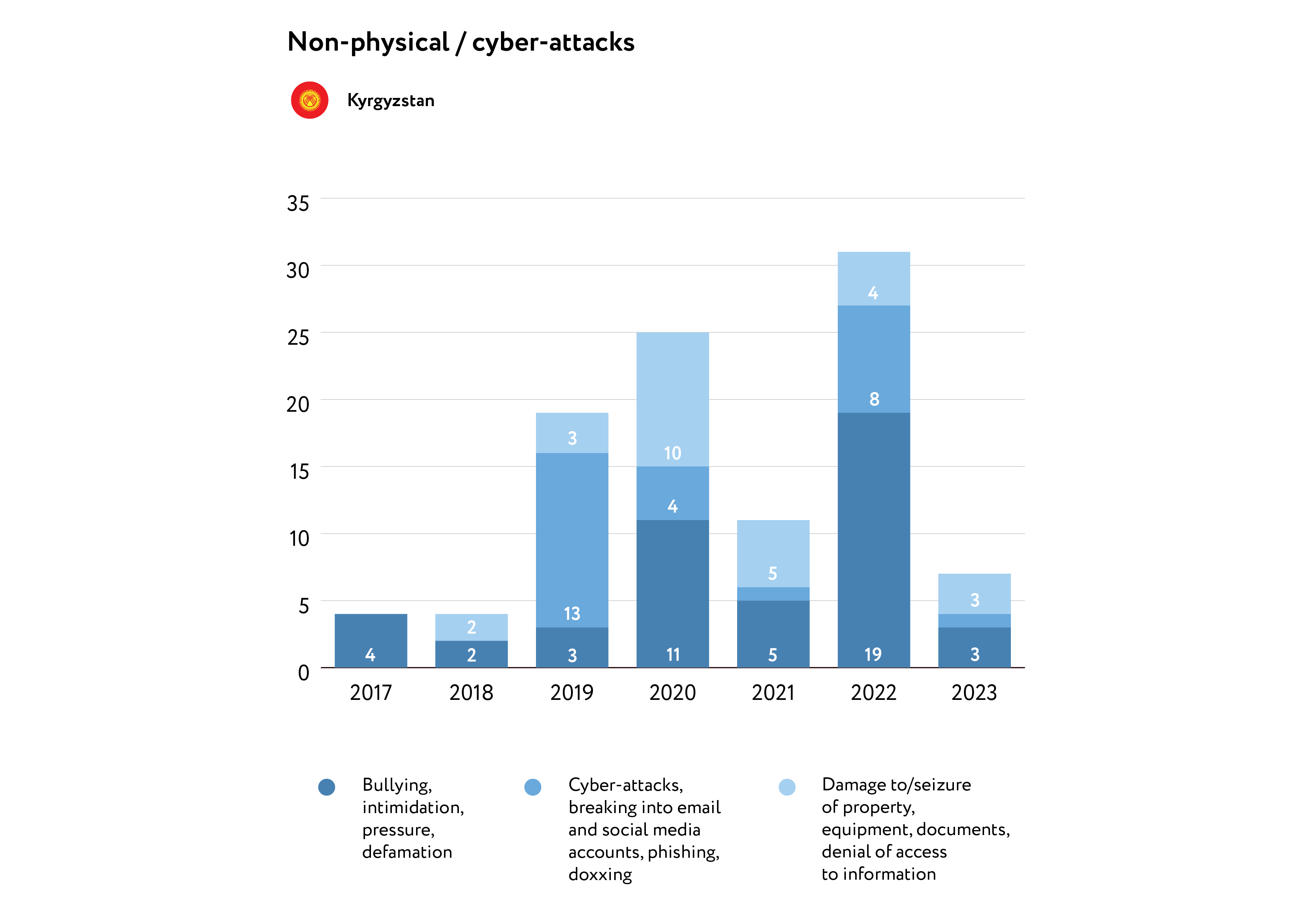
Other cases of bullying/intimidation include:
- On 6 May, the editor-in-chief of “PolitKlinika”, Dilbar Alimova, reported on Facebook that an unknown man called her and introduced himself as Bekzhan, an employee of the State Committee for National Security. “He asked me to come to their office, saying that he wanted to ask me a couple of questions. I replied that they should send me an official invite (for an interrogation), otherwise I won’t go,” Dilbar wrote. The caller stated that if she did not show up, she’d be brought in by force. According to Alimova, this was due to a publication about a letter allegedly written by the Speaker of Parliament, in which he asked to “rehabilitate the fugitive president Kurmanbek Bakiyev.” After the article was published, the press office of the Speaker of Parliament denied the existence of such a letter.
- From 1-6 October, Vesti.kg editor-in-chief Gladis Temirchieva and several other NGOs and media representatives in Kyrgyzstan took part in the Human Dimension Conference in Warsaw. Temerchieva’s colleagues Semetey Karypkulov, Gulshayir Abdirasulova and Timur Sultanov were invited as speakers to a separate event on 6 October dedicated to freedom of assembly. After speaking at the event, Temirchieva and Karypkulov were harassed by fake accounts and supporters of the Kyrgyzstan authorities, in particular supporters of the MP Nadira Narmatova, who has introduced a package of amendments to the law “On NGOs.” The posts and comments included calls to prosecute the journalists and have them arrested, calling them “enemies of the state.”
There were also two recorded incidents related to illegal obstruction of journalistic activities by representatives of the authorities:
- On 13 September, several journalists, including Kaktus.media journalist Marat Uraliev, were not allowed to attend a hearing at the Bishkek City Court. Reporters arrived to cover events surrounding the case of the arrested opposition parliament member, Adakham Madumarov, who is suspected of treason. A rally of his supporters took place near the court building. Bailiffs stood at the entrance to the court and did not let anyone in, claiming that the presiding judge demanded the trial be held behind closed doors.
- On 13 December, Kloop.kg journalists tried to obtain accreditation to cover the upcoming People’s Kurultai (an annual meeting between public representatives, delegates of local communities from different regions of Kyrgyzstan and the President of the Kyrgyz Republic). As the president’s press secretary, Askat Alagozov, explained, the refusal to accredit journalists was related to the decision by the Ministry of Culture to block the outlet’s website and file lawsuits against it. Kloop.media websites in Kyrgyz and Russian are blocked in Kyrgyzstan.
There was one cyber-attack recorded in 2023:
- On 14 July, the “Radio Azattyk” YouTube channel was hacked. This happened a day after legal proceedings against this independent media outlet were terminated, and a settlement agreement was reached. The video hosting team at Google confirmed the cyber-attack had taken place and began work on restoring the channel. All of Azattyk’s websites have been blocked since the end of October 2022 following a decision by the Ministry of Culture, Information, Sports and Youth Policy. On 14 July 2023, they became available again in Kyrgyzstan.
6/ ATTACKS VIA JUDICIAL AND/OR ECONOMIC MEANS
In 2022, there was a sharp increase in attacks of this kind against media workers. However, in 2023, the number of attacks of this type almost halved. The most common methods of pressure were interrogations at the State Committee for National Security, searches and confiscations, and trials.
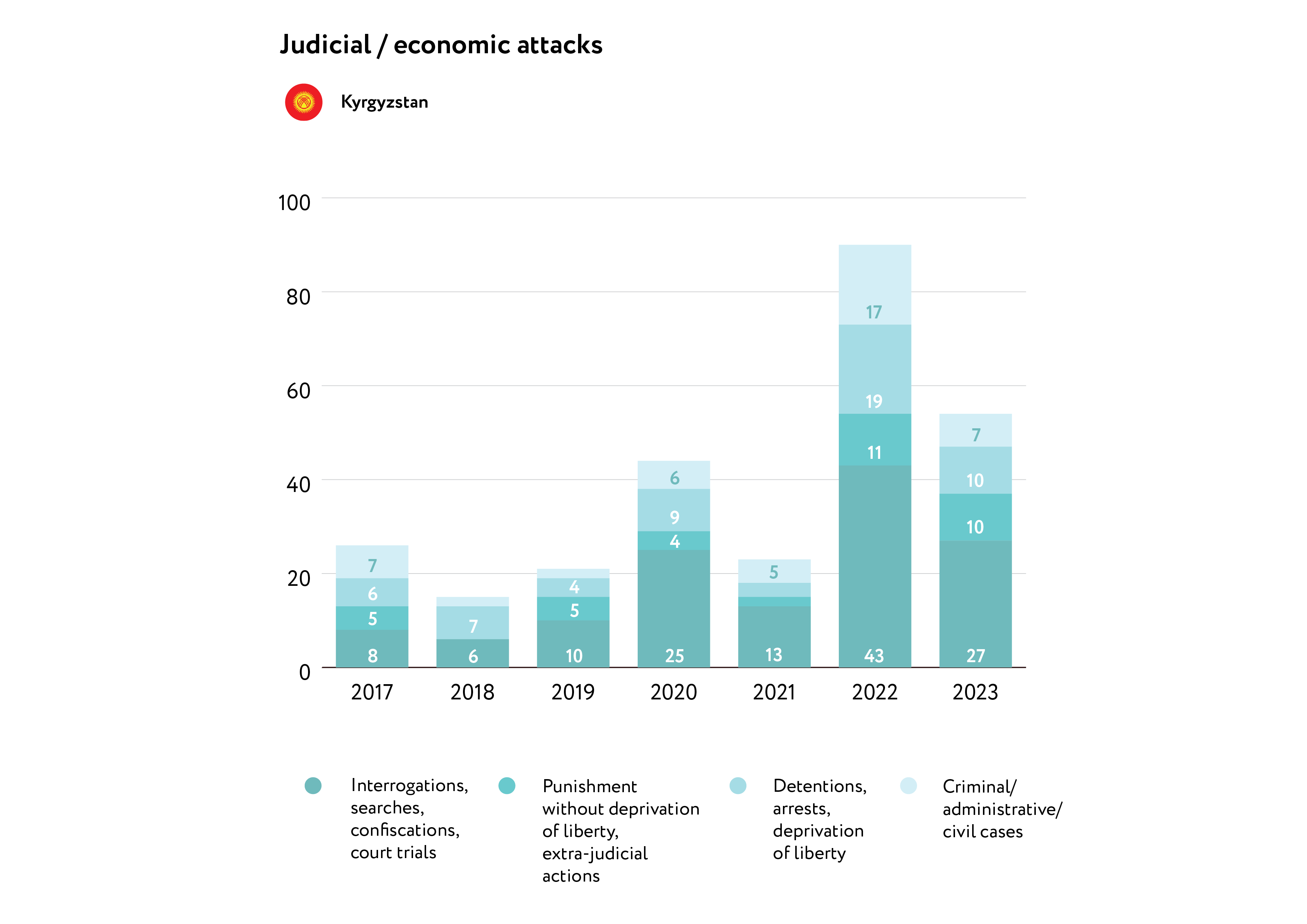
In 2023, at least 11 incidents were recorded involving journalists and bloggers being called in for questioning by various enforcement agencies. These included:
- On 6 February, independent journalist Ydyrys Isakov was called in for questioning by police. Isakov was already interrogated by the police on 5 February in relation to a TikTok video about President Sadyr Japarov. According to the police, a user with the nickname “Albert” published a video titled “Kyrgyzstan, wake up, the Uyghur mafia is robbing Kyrgyzstan,” which allegedly contained an appeal made by Isakov.
- On 6 February, the head of the 24.kg news agency Asel Otorbaeva was called in for questioning by the State Committee for National Security. According to her, the SCNS opened a criminal case based on a publication on the news agency’s website. She stressed that her lawyer was present throughout her interrogation, and the interrogator conducted the procedure correctly, with no abuse of authority.
- On 9 February, blogger Mirlanbek Maratbek uulu was called in for questioning. The blogger stated that he did not know what the interrogation was connected to.
- On 2 March, 24.kg output editor Anastasia Mokrenko was called in for questioning at the State Committee for National Security in Bishkek in connection with a criminal case related to a bomb threat in the “Red Centre” shopping centre. An intelligence officer came to the media outlet’s office and told Mokrenko to come with him to the SCNS department, ignoring her demands for an official subpoena and to be accompanied by her lawyer. She was taken away from the office during working hours. At the State Committee for National Security Department, she was interrogated as a witness and asked questions about the day of the bomb threat. Anastasia Mokrenko had first seen an email about the explosive device in the 24.kg editorial inbox. The same email was sent to several other organisations. The threat turned out to be false.
- On 7 December, journalist and host of the “Archa Media” YouTube channel, Kunduz Zholdubaeva, revealed that she was interrogated at the Department of Internal Affairs in the Pervomaisky district. The interrogation was carried out at the request of MP Nadira Narmatova. She appealed to the Ministry of Internal Affairs, asking that they take action against Kunduz, as well as her live broadcast guest – Makhabat Tajibek kyzy, the wife of investigative journalist Bolot Temirov. She accused them of “making statements discrediting her honour and dignity.” Earlier in November, the “Archa Media” YouTube channel released a report about possible connections of some members of parliament and officials with Raim Matraimov, a former customs officer convicted of corruption, as well as Kamchy Kolbaev – a mafia boss and drug lord, who was recently killed by the authorities.
In 2023, the State National Security Service (SCNS) and other security and law enforcement agencies prosecuted media workers for investigative journalism and critical publications. Authorities cited vaguely worded laws from the Kyrgyz Criminal Code such as “inciting ethnic and other types of hatred” (Article 330) or “calls for disobedience to authorities and mass riots” (Article 278). Both laws carry prison sentences ranging from five to eight years. In 2023, these criminal articles were also widely used against bloggers and Internet activists.
- On 12 January, the Bishkek City Court sentenced blogger Adilet Baltabay to five years in prison, finding him guilty of “inciting mass riots.” Pressure on the blogger began back in June 2022, when he was called in for questioning by the State Committee for National Security and held in a pre-trial detention centre. The activist was persecuted as a result of posts on Facebook. According to him, investigators “selected” around 30 Facebook posts in which the investigative examination allegedly identified calls for mass unrest. In his posts, Baltabay wrote about the pressure on freedom of speech in Kyrgyzstan and expressed critical opinions about the mining deposits and their potential development, which is being discussed with investors at the authorities’ initiative. He also took part in protests and spoke out in defence of investigative journalist Bolot Temirov, who was expelled from the country and raised other problematic topics.
- On 18 April, the Pervomaisky District Court of Bishkek completed its review of the criminal case against blogger Semetey Talas uulu, sentencing him to one year of probation. Judge Mirbek Satarbek uulu found the blogger guilty of “Production and distribution of extremist materials.” He was detained in November 2022 for publishing a post on Facebook. Later the sentencing measure was changed to house arrest.
- On 24 August, the Pervomaisky District Court of Bishkek considered preventive measures against journalist Olzhabai Shakir. The journalist was detained on 23 August by officers of the State Committee for National Security, interrogated and escorted to a temporary detention facility. He was accused of calling for active disobedience to law enforcement officers, mass riots and an attempt to seize power. Earlier, Shakir announced on Facebook that on 31 August, Kyrgyzstan’s Independence Day, he intended to hold a rally against the transfer of four boarding houses in the Lake Issyk-Kul region under Uzbekistan’s control. Kyrgyz authorities intend to hand over these recreation facilities for 49 years. Over the past month, this issue has been widely discussed across the country.
- On 16 November, it was discovered that the editor-in-chief of Nazar.news Gulzhan Sheripbayeva was accused of inciting mass riots. According to media reports, she was charged in the presence of a duty lawyer. The journalist was placed in the temporary detention centre of the State Committee for National Security. Earlier, Sheripbaeva posted on social media that she was taken to the SCNS for interrogation. The details of the interrogation are not known, and it is yet to be established which specific statements or publications her case is related to. Earlier in October, the Ministry of Culture ruled to block the Nazar.news website unless journalists removed reports that the ministry considers false and discrediting the honour, dignity and business reputation of the head of the Cabinet of Ministers Akylbek Japarov. After receiving the warning, the media outlet deleted the publication in question and the website was not blocked.
- On 4 December, the Pervomaisky District Court of Bishkek acquitted 19-year-old blogger Yrys Zhekshenaliev, who initially was accused of inviting mass riots (part 3 of Article 278 of the Criminal Code) after reposting an archived video message from the ex-chairman of the State Committee for National Security on Facebook, in which he calls for the development of the Zhetim-Too mining field in the Naryn region to be abandoned. The blogger was arrested in 2022. A criminal case was brought against him under the article on “Mass Riots”, and the state prosecution requested a sentence of six years in prison.
- On 8 December, the Sverdlovsk District Court of Bishkek issued a two-month arrest warrant for Aftandil Zhorobekov, a blogger and administrator of the Bespredel.kg Facebook page. The blogger was charged with inciting active disobedience to government officials and for inciting mass riots (Part 3 of Article 278 of the Criminal Code). The arrest was preceded by a search, which resulted in the confiscation of computers, smartphones, flash cards and hard drives. On his Facebook page, Zhorobekov made statements against the parliament’s initiative to change the design of the state flag of Kyrgyzstan. The parliament concluded that the central image “looks like a sunflower” and therefore it needs to be changed. The corresponding law has already been adopted in the first reading. Earlier, the blogger initiated the “Hands Off the National Flag” rally, inviting others to join him, for which he was called in for questioning twice by the State National Security Service.
Other incidents involving the arrests of journalists and bloggers include:
- On 4 February, the Batken District Court issued a verdict against blogger Batmakan Zholboldueva. Zholboldueva was sentenced to two years of probation. In addition, the court forbade her from blogging. Batmakan was found guilty of hooliganism for causing physical harm to the chief of staff of the Batken regional administration, Alikhan Uraimov. She was also found guilty of violating the privacy of Arzygul Galymbetova and forging documents. On 22 May, the Batken Regional Court amended the verdict of the district court. Zholbolduyeva was acquitted of two counts relating to the death of “AKIpress” journalist Arzygul Galymbetova. The latter, the day before her death, posted on her Facebook page that the blogger allegedly “wanted her dead and put a spell on her.” The court also lifted the ban on Zholboldueva’s blogging activities. Under the article on “Hooliganism,” she was fined 50 thousand som (around 550 USD), and in relation to forging documents, which she was also accused of, the court sentenced her to one year of probation. Zholboldueva was detained last year on the grounds of a criminal case brought against her for causing death by negligence.
- On 16 July, the Osh City Court considered preventive measures against blogger Ulukbek Karybek uulu. The judge recognised the blogger’s detention as legal but did not grant the investigator’s request to place him in custody for two months, releasing him from the courtroom on the condition that he not leave the country. On 14 July, Ulukbek was detained for 48 hours on suspicion of hooliganism. He was detained in Bishkek and transported by the police to Osh at the request of the Osh Interregional United Clinical Hospital staff. A case against Karybek uulu was opened under the article “Hooliganism” of the Criminal Code of the Kyrgyz Republic. Later it became known that the Ministry of Internal Affairs had submitted another case against the blogger. According to this case, the blogger broke into the Kyrgyz Ministry of Health building and asked the minister to leave his office. He was accused of violating Article 128 (“Disobedience to the legal requirement of an internal affairs officer”) of the Code of Offences of the Kyrgyz Republic.
In 2023, one incident related to the closure and/or blocking of media was recorded:
- On 12 September, the Kloop.kg website was blocked in Kyrgyzstan following a decision by the Ministry of Culture, which was made regarding a complaint by the State Committee for National Security based on the law on “fake news”. The complaint, submitted on 6 September, is related to an article entitled “Imperial Kyrgyzstan. Why do people in the republic support Russia?” which contains information about the torture of opposition politician Ravshan Dzheenbekov in a pre-trial detention centre. According to the State Committee for National Security, the report “is not based in reality and discredits the reputation of the SCNS.” As it says in the intelligence service’ statement, the article is “provocative in nature… and amid the ongoing hostilities between Russia and Ukraine … could lead to interethnic confrontation between Kyrgyz and Russians on the territory of the Kyrgyz Republic.” On 10 February 2024, the Oktyabrsky District Court of Bishkek decided to shut down the Public Foundation “Kloop Media” – one of the legal entities of the independent media outlet Kloop.
Other incidents include:
- On 12 July, the Bishkek City Court approved a settlement agreement between “Azattyk Media” and the Ministry of Culture, overturning the decision of the Leninsky District Court to shut down the media outlet. Thus, the proceedings in the case were terminated. Due to changes in general content storage protocols on the Radio Free Europe/Radio Liberty websites, content is not retained indefinitely, and as a result, the video which formed the basis of the lawsuit is no longer available on RFE/RL websites. In light of the court’s decision to approve the settlement agreement, the Ministry of Culture will send a letter to the Ministry of Digital Development requesting that the “Azattyk” website be reinstated.
- On 31 October, MBank blocked an account used for donations to Temirov Live. The bank explained that according to its rules, “an individual client can only use the bank’s account and mobile app for transactions of a personal nature.” A day before this block was applied, on 30 October, the founder of Temirov Live, investigative journalist Bolot Temirov, announced that he had opened an account with MBank to collect donations which will help “to fight corruption and lawlessness of the authorities.” Earlier, in 2022, he tried to crowdsource funds to support the work of investigative journalists. Previously, the Temirov Live team released several high-profile investigations into corruption in the highest echelons of power, one of which had a mention of the head of the State Committee for National Security, Kamchybek Tashiev. On 23 November 2022, the Bishkek City Court ruled to expel Temirov from Kyrgyzstan. Immediately after the court decision was announced, the journalist was removed from the building, escorted to the airport and, accompanied by the Interior Ministry officers, was deported to Russia.
ANNEX 1: OPEN SOURCES USED FOR GATHERING DATA (KYRGYZSTAN)
- 24.kg – a website, a news agency covering events in Kyrgyzstan;
- Bulak.kg – an online media outlet;
- Civicus – an international non-profit organisation, which describes itself as “a global alliance dedicated to strengthening citizen action and civil society around the world;
- Freedom House – a non-profit organization group in Washington, D.C. It is best known for political advocacy surrounding issues of democracy, political freedom, and human rights.
- Kaktus.media – an online media outlet covering events in Kyrgyzstan;
- Kloop.kg – an online media outlet covering and analysing events in Kyrgyzstan;
- Knews.kg – a news agency, news and analysis;
- National Statistical Committee of the Kyrgyz Republic – the central statistical office of the country;
- Radio Azattyk – the Kyrgyzstan service of Radio Liberty, providing daily coverage and analysis of events in Kyrgyzstan;
- Reporters Without Borders – an international non-profit and non-governmental organization that safeguards the right to freedom of information;
- School of Peacemaking and Media Technology in Central Asia – a non-profit organisation specialising in research in the sphere of media, annual ratings of freedom of expression, and media monitoring;
- Telegram channels and social media accounts of Kyrgyzstan’s journalists, bloggers and media outlets.
